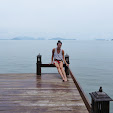I'm now around four weeks into my time Down Under, and having secured a job and a place to live, I think it's a good time to go through my step-by-step guide to the working holiday visa process. So here's part one: all the things you can do before you leave. Oh, and because this is wordy I've just put in some random Sydney pictures. Enjoy!
- Apply for the visa. You have to be between the ages of 18 and 30 to be eligible, and it's open to most European residents (417) as well as young people from several Asian countries and the US (462). It allows you to stay in Australia for up to one year after entry (which can be any time up to one year after your visa is granted), and work for any employer up to 6 months.
- Book flights. I always use Skyscanner first for their handy feature that lets you see flight prices for your selected route over an entire month, but book through STA because cheap flights is their thing (and if you find a flight cheaper than theirs listed, it's their policy to beat it). A return flight might raise fewer questions from immigration on arrival in Australia, although the nature of your visa tends not to invite too much scrutiny. However, if you do not have onward passage or a return flight to your home country booked, you may be asked to prove that you have access to funds to sustain yourself (usually around $5000). I was not asked a single question on arrival at Sydney Kingsford Smith International Airport, but I say always err on the side of caution.
- Buy travel insurance. Price comparison websites like Travel Supermarket are a good place to start: in terms of general suggestions, I've been recommended the AA, World Nomads and Insure With Ease, or iNext for Americans. Bare in mind though that travel insurance will not cover any on-the-job accidents, and you may have to pay extra for certain activities (like diving below a certain depth). The key thing to look for is repatriation in case of emergency (or death) because that's a costly thing without insurance.
- Set up a bank account. The big banks out here are Commonwealth Bank, Westpac, ANZ and National Australia Bank - many of them offer an online service that allows you to create an account from your home country and activate in branch on arrival. Word of advice here though: if you do this, DO NOT transfer money before you leave, because there will be a block on your Australian account causing the funds to bounce back to your home account. Instead, wait to activate the account in person in Oz and make the transfer afterwards. Either way, make sure your home account has online banking that allows international personal payments, and possibly consider making a trusted family member at home a proxy just in case.
- Pack well. I've learnt this one the hard way, hence several posts on the topic, but packing is important to do well. Bring plenty of essentials, but bear in mind that Australia is a developed country with many shopping areas and you can buy small products like toiletries and t-shirts when you get here. There's nothing more frustrating than having to remove layers of clothing at the airport in order to meet weight restrictions (as my flatmate will attest) so weigh as you go.
- Make copies of important documents. Email yourself a scan of your passport as well as important visa information, travel insurance documents, credit card if you have one, and anything else you might think useful (like vaccination records if you're planning to travel to high-risk countries). Online storage like Dropbox are also useful.
- Book a hostel for your first night, or if you're lucky like me, make sure you have a friend you can crash with. Australia is miles from fucking anywhere so flights are always long and you will inevitably be jet-lagged when you arrive, so don't just trust that you'll find accommodation for the night once you're here. Give yourself some peace of mind. Hostelworld is probably the best resource, but I've had good experiences CouchSurfing too (though if you'd rather have a proper bed to sleep in on your first night, it's probably best to save that for your later travels).
These are the most important things I can think of in terms of being prepared before you fly out. There are some things you can't really arrange until you get here, so stay tuned for Part 2: Getting Settled!







No comments:
Post a Comment